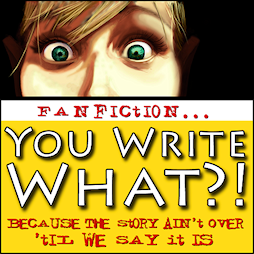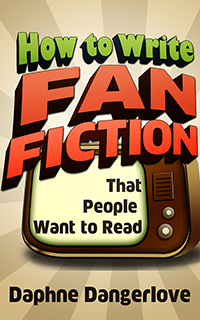Wouldn’t it be nice if Webster came through, picked out all the confusing/foreign/
over-our-head fanfic terminology, and wrote up a special dictionary just for fanfic
writers and readers to use?
<insert dreamy sigh here>
A girl can dream, right?
I’m sure we’ve all wished for something to help decipher the sometimes-confusing
jargon associated with a story at one time or another. While Webster may be in
no hurry to help us out, there’s still some hope! I took to Twitter and Facebook
to ask writers and readers alike what some of the most confusing acronyms and
terms in the fanfic world are. You may recognize some of these terms from YWW’s
original Fanfictionary piece from March. With any luck, a few of these terms will be
new to you, and this list will help make the world of fanfiction a wee bit easier to
understand.
AH: All-Human
While the characters in the original work may have had supernatural powers
(vampire, werewolf, fairy, etc.), the characters in an AH fanfic are all living,
breathing humans.
A/N: Author’s Note
These are commonly found at the beginning of a chapter. Author’s use these to
communicate with readers, whether it be to thank them, inform them about a
special outtake or upcoming events, give out a content warning, or announce
something about a contest, compilation, blog update, or the like. These may pop up
at the end of a chapter on occasion as well.
Angst:
I could write all day about angst, as it’s my favorite genre, but I’ll just say this – angst
stories hurt. The characters in these stories often feel excessive amounts of pain
and anger. These stories often deal with serious issues such as abuse, substance
abuse, self-harm, infidelity, and many more topics. If you’re lucky you might find
one of these that ends on a happy note, but I usually don’t recommend going in to an
angst story expecting the best outcomes.
AU: Alternate Universe
In an AU fanfic, the majority of the story elements are far removed from the original
story. For example, if the original story was set in the 1940s in Santa Monica, CA,
an AU version of it might be set in New York City in 1990. The characters in AU
stories are generally the same as the ones from the original fic, but they might have
different personalities or appearances.
Beta:
A beta is the fanfic equivalent of an editor. A beta reads an author’s chapters, fixes
any spelling errors, grammar errors, or general structural errors, and then returns
the piece to the author to post. Sometimes betas work with an author to re-structure
a plot if the author has deviated, or to help develop the characters more if the author
hasn’t done this very well. While the author is responsible for creating the story, I
like to think of the beta as the one who puts a little extra sparkle on it before it goes
public.
Canon:
A canon fanfic story contains one or more elements from the original story. Common
examples of canon items are relationship pairings, physical appearances, and
character personality traits. In addition, the setting, backstory, and elements of the
plot can also be canon as well.
Crackfic:
A crackfic is a completely crazy story. The characters do things that are off-the-
wall and often funny, the plot makes no sense whatsoever, and more often than not
readers sit back and wonder “what he/she smoking crack when writing that?” after
finishing the story.
DED:
DED is simply the way some people refer to “dead.” I’ve seen some reviews where
people say, “I’m DED,” or “This chapter left me DED.” I would guess it could have
both positive and negative connotations, depending on what it was in the chapter or
scene that made someone feel that way.
Fandom:
Fandom refers to the collective group of people who are all fans of a particular film,
book series, TV show, comic book, cartoon, etc. Fanfiction authors are typically
members of the fandom that their story is based off of.
Favorite Story/Author:
This is a function on most of the major sites where authors post their fanfiction
work. On FanFicton.net, for example, you have the option to add an author to your
favorite’s list or add a story to your favorite’s list. These lists are public, and other
writers and readers can pull them up off of someone’s profile. Placing authors
or stories on your favorites lists makes these items easy to access in the future.
Authors get email alerts when they or their stories are favorited.
Follow Story/Author:
This is another function on most of the major sites, although it’s also known
as ‘alerting’ a story or an author. There is no public list of stories or authors a
person has followed/alerted. When you choose to follow a story, you will receive
email alerts when the story updates. When you choose to follow an author, you will
receive email alerts when the author posts a new piece of work, or when he or she
updates any existing pieces of work. As with favorited items, authors receive email
alerts when they or their stories are favorited.
Hard Limit:
In the fic world, a hard limit is a story element that prevents the reader from
starting the story or finishing the story. Examples of hard limits are character
deaths, slash relationships, rape, abuse, or non-canon pairings. It’s always a good
idea for an author to disclose any potential hard limits in the story’s disclaimer or
the first author’s note.
HEA: Happily Ever After
A HEA fanfic story has just that – a happily ever after! HEA stories may have a bit of
angst woven in at different points, but when all is said and done, boy has met girl
(or boy) and they live happily in their big house with the white picket fence and 2.5
children (or furry substitutes). Love typically prevails in a HEA story, although it
may be friendship or family ties that prevail instead. If you decide to read this type
of story, you will be smiling at the end.
Lemon:
Simply put, a lemon is a sex scene. The details are juicy (hence ‘lemon’), there is
often graphic and explicit sexual content in the scenes, and well-written ones leave
readers in a hot mess looking for more. Occasionally an entire story is considered
a lemon because it consists of content that is purely sexual in nature. Lemons are
often very popular – sometimes even craved – by fanfic readers.
OOC: Out of Character
This means that the characters in a fanfic piece behave in ways that are different
than how they behaved in the original fiction piece. For example, Edward Cullen is
quite chivalrous in the Twilight series. An OOC fan fiction piece might feature him as
arrogant, abusive, or just plain an asshole.
PPS: Please Post Soon
This is an acronym often used by readers in their reviews, and sometimes when
communicating with an author on social networks like Twitter or Facebook. We all
know how it is to fall in love with someone’s story. When a reader is eager for more,
PPS is their way of asking the author to share more – soon!
Pre-Reader:
I’ve often seen the terms “pre-reader” and “beta” intermingled, but to me (and
to some others in the fic world that I talked to), a pre-reader is in fact a different
thing. While a beta goes through and makes corrections to the story itself, a pre-
reader exists to provide nothing but creative feedback on the writing. A pre-reader
will read a chapter and then discuss any ideas he or she has in terms of the plot,
characters, backstories, or details with the writer. A pre-reader offers creative input,
maybe even helps the author with parts of a story at times. While a beta may do all
of these things as well, pre-readers generally don’t do any of the crossover tasks of a
beta.
R&R: Read and Review
R&R is a term used by an author. I’ve typically seen it in the Author’s Note at the
beginning of a chapter. Essentially, this is the author’s way of asking readers to not
only read the chapter, but also to review the chapter after they’ve read it.
Reviews:
Reviews are comments that readers can post for each chapter of a story. Reviews
are public, but reviewers have the option to leave anonymous reviews if they wish.
Anonymous reviews aren’t always positive, however, and are frowned upon by
some people in the fanfic community. Reviews can be good, bad, or downright ugly
at times. Reviews are also a way that authors gauge the popularity of their stories,
which can be both a positive and a negative thing in the big scheme of things.
Slash:
A slash story contains a homosexual relationship. Usually one of the members
involved in the relationship is a canon character from the original fiction work.
Slash involving two males is generally referred to solely as “slash,” while slash
involving two females can be known as “slash,” “femmeslash,” or “femslash.” Slash
relationships can be a hard limit for certain readers, so it’s a good idea to indicate in
a disclaimer or A/N that the fic contains one.
UST: Unresolved Sexual Tension
Ever read a fic where two characters are clearly sexually attracted to one another,
but they do a beautifully constructed dance around one another for the first five
or six chapters? Those five or six chapters would contain quite a bit of what we in
the fanfic world call UST – unresolved sexual tension. UST is typically not acted on
immediately, and leaves readers wanting more and chomping at the bit to read the
next update. UST involves a lot of buildup, maybe some casual flirting and an almost
kiss or two. The characters in question may be involved in relationships with other
people, but still have a lot of UST between them. Readers are often eager to see
these characters act on their desires – if the author decides to let them!
Views:
Views refer to the total number of times a page is visited by a user. For example, if a
story has 5,000 views, then that means the page was accessed 5,000 times. In other
words, the story was viewed 5,000 times, although these may include repeat views
for a single page by a user or could be a new view on a single page from different
users.
Visitors:
A visitor is a person who views multiple pages on the site. For example, if a user
accesses a story, reads the first chapter and likes it, then proceeds to read all 18
additional chapters and read the other three stories an author has posted, that user
would now be considered a visitor. A story may have hundreds of thousands of page
views, but only a few thousand visitors, as only a few thousand people actually read
the story and actually navigate through the pages.
This is only a relatively small collection of the terms that are used on a daily basis in
the fanfiction world.
Hopefully this post can help fanfiction newcomers get their toes wet and start to
understand more of what is meant by the different words and acronyms authors
and reviewers alike use on a regular basis.
Got any more terms you’d like to see defined? Simply leave a comment here and I’ll
comment back with the information I come up with!
Happy writing – and reading!
Author: Nikki Storebo, Staff Blogger
Fanfic writer, 'Hot Commodity' and other Twilight goodies.
Blueeyedcherry in the fandom.
RPExaminer on Twitter.












1 comments:
I had never seen DED or UST! Wow, this list can be extensive
Post a Comment